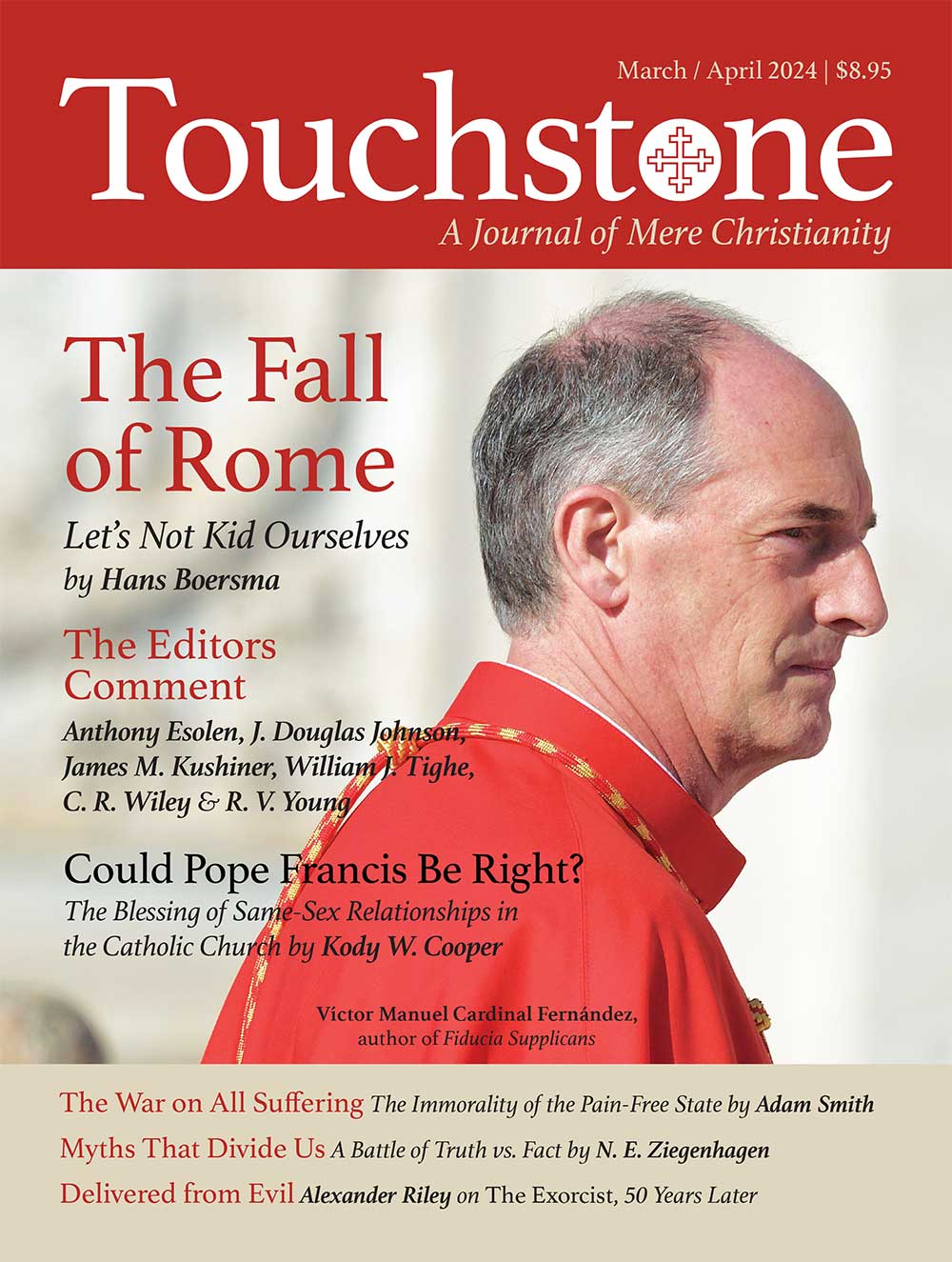The War on All Suffering
The Immorality of the Pain-Free State
In a well-known passage from A Sand County Almanac, Aldo Leopold writes about shooting a wolf:
We reached the old wolf in time to watch a fierce green fire dying in her eyes. I realized then, and have known ever since, that there was something new to me in those eyes—something known only to the mountain. I was young then, and full of trigger-itch; I thought that because fewer wolves meant more deer, that no wolves would mean hunters’ paradise. But after seeing the green fire die, I sensed that neither the wolf nor the mountain agreed with such a view.
Now, whatever wolves and mountains think, and whatever Aldo Leopold came to understand, it’s obvious that a lot of humans do agree with such a view. Plenty of people feel the trigger-itch, and not all of them have the excuse of being young. But these days it’s not usually the hunters who feel that itch to control the landscape and make it paradise. It’s those we might call “the humanitarians.”
Martha Nussbaum is one of the most influential and respected philosophers working today. In some of her recent work, she argues that, assuming we had the technical ability, we might have a moral duty to stop predators from eating other animals. This follows from her idea that one of our basic moral duties is to prevent suffering whenever we can. When the wolf kills a deer, the deer suffers, and if we can, we should stop that from happening, maybe by genetically engineering the wolf to live on grass like the deer, or by providing the wolf with lab-grown venison.
The Everyday War
Now, if you think there is an easy rebuttal to her argument, you are wrong. If you are thinking, for example, that wolves eating deer is just natural, then she will remind you that men raping women is also “natural,” or at least that this has often been how people excuse it. For her, it is not about what’s “natural.” It’s just about suffering, natural or otherwise. In her 2006 book, Frontiers of Justice, she says that “the death of a gazelle after painful torture is just as bad for the gazelle when torture is inflicted by a tiger as when it is done by a human being.”
There are many ways to rebut this claim, but this is not a philosophy paper, and Nussbaum’s argument is not my subject. It’s just an especially stark example of the first thing I want to consider, which is what Ivan Illich called “the war against all suffering.” Nussbaum is fighting this war on suffering. More than that: she’s advancing the front lines of that war deep into the hostile territory of nature. Leopold killed the wolf so the deer could live (albeit so he could then go and shoot the deer). Nussbaum also wants the deer to live, but she’s more humane. She only wants to kill the wolf’s spirit. The wolf must live, but the green fire has to die.
Readers of Touchstone may already have a good sense of what Illich is talking about, even if they have never read his work and aren’t familiar with that phrase. Nussbaum is at the front lines, where things get weird, because that’s where we philosophers like to be. But the war on suffering is very old. It’s been going on for a long time, and most people live well behind the front lines, in the world the war has built, and for them, it’s just everyday life.
The everyday war on suffering is on my mind right now because we’re just about to have our third child. I’m sure many of you have some personal experience with what’s called the “medicalization of childbirth.” I mean the unnecessary monitoring and intervention, including the pressure to induce or even to undergo a c-section. It’s the subject of sustained and intense criticism, not just in books by gadflies like Illich but in prestigious medical journals and in the recommendations of professional associations. None of that criticism has made much difference, because the medicalization of childbirth is part of the war, and to the good soldiers in the birthing suite, every intervention becomes “necessary” when there is any chance it will prevent suffering.
There are two hospitals within five minutes of our house, but my wife drives an hour away to her appointments so she can be seen by a midwife who isn’t a very good soldier, and is for that reason an excellent midwife. Unfortunately, she’s going to be away on vacation on our baby’s official due date, which means there’s a chance the baby will be delivered by a doctor instead. The midwife has already warned my wife about the pressure the doctors will likely put on her, the lectures they’ll give her for not wanting to do this or that. Which do you think we’re more anxious about—the suffering of delivery, or the war the doctor wants to wage on that suffering?
A Single Moral Rule
It’s pretty clear what I think of the war on suffering. Like Leopold, I don’t want the green fire to die. But I want all of us hopeless romantics to sit for a minute with the conviction that fuels Nussbaum’s war. Deep down, the war on suffering is fueled by the feeling that no matter how pretty it is, no matter how much poetry it inspires, maybe the green fire isn’t worth the pain. And which of us hasn’t felt the force of that feeling, at least once in our lives, if not every day?
Adam Smith is Associate Professor of Political Philosophy and Director of the Honors Program at the University of Dubuque. He also serves as Associate Editor for Front Porch Republic.
subscription options
Order
Print/Online Subscription

Get six issues (one year) of Touchstone PLUS full online access including pdf downloads for only $39.95. That's only $3.34 per month!
Order
Online Only
Subscription

Get a one-year full-access subscription to the Touchstone online archives for only $19.95. That's only $1.66 per month!
bulk subscriptions
Order Touchstone subscriptions in bulk and save $10 per sub! Each subscription includes 6 issues of Touchstone plus full online access to touchstonemag.com—including archives, videos, and pdf downloads of recent issues for only $29.95 each! Great for churches or study groups.
Transactions will be processed on a secure server.
more from the online archives

15.6—July/August 2002
Things Hidden Since the Beginning of the World
The Shape of Divine Providence & Human History by James Hitchcock
calling all readers
Please Donate
"There are magazines worth reading but few worth saving . . . Touchstone is just such a magazine."
—Alice von Hildebrand
"Here we do not concede one square millimeter of territory to falsehood, folly, contemporary sentimentality, or fashion. We speak the truth, and let God be our judge. . . . Touchstone is the one committedly Christian conservative journal."
—Anthony Esolen, Touchstone senior editor









